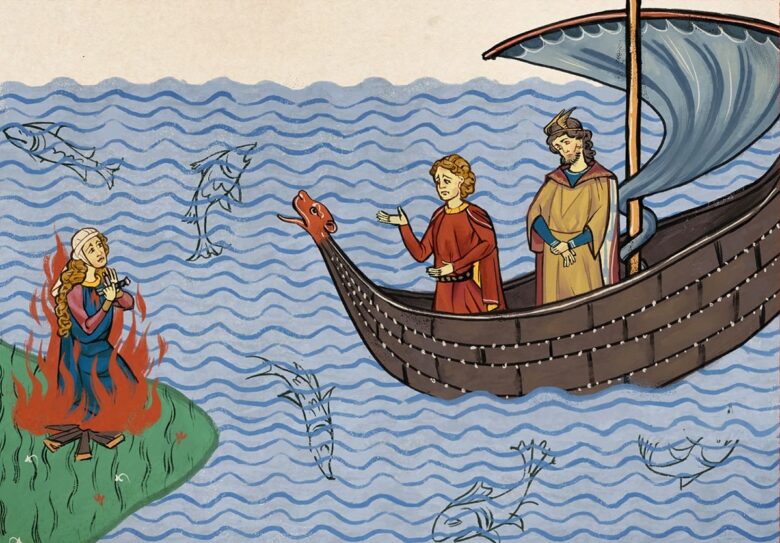Welcome back readers.
After a short break and a jam-packed catch-up issue, we’re getting back to our usual weekly stride with thirteen new-and-cool selections for your reading pleasure.
This Week in Videogame Blogging is a roundup highlighting the most important critical writing on games from the past seven days.
Mystery Machines
Our opening section this week is genre-specific, looking at design, structure and theme in recent mystery games.
- A Tale of Two Relics | Unwinnable
Madison Butler describes different approaches to player identifiation and narrative struture in The Case of the Golden Idol and Return of the Obra Dinn. - Pentiment: Thirteen Ways to Look at a Murder | Unwinnable
Francisco Dominguez charts Pentiment’s modernist influences through its engagement with unreliability and unknowability.
“Having been reminded of my own truth so powerfully by the game, of course I told Tassing their own. I still wonder what they made of it.”
Follow-Up Act
Let’s shift genres now to RPGs, and in particular, a pair of sequels with a lot riding on them at the time.
- Building on the Past – Final Fantasy XIV: A Realm Reborn | PixPen
Sam Howitt embarks upon an expedition to Eorzea. - Langrisser 2+2 | Kimimi The Game-Eating She-Monster
Kimimi continues her survey of the tactical RPG series with this samey but serviceable course correction after the more experimental Langrisser III.
“So Langrisser IV is creatively timid, and unfortunately you can feel that as you play. It’s cautious. It’s eager to please, to show you things that are like other things you’ve seen before. It doesn’t try to beat Der Langrisser at its own standard-setting game, but meekly offers something comfortably similar to it instead.”
Language Support
Our next section focuses on language, etymology, and localization.
- Bahamut and Behemoth: One and the Same? | Thrilling Tales of Old Video Games
Drew Mackie delves into the etymological history of some of Final Fantasy‘s longest-running mythological figures. - The Cantonese language (or the lack of it) in games | Eurogamer.net
Alan Wen traces the outlines of a langauge broadly absent from games localization.
“It’s strange for me to write about this given that my Cantonese is actually terrible, which I attribute to being born and raised in the UK, which comes with the cross-cultural baggage of trying to fit in and resenting your own heritage. But while I lack the vocabulary to converse in important subjects like politics, it’s also impossible not to consider the politics of Cantonese being eroded by Mandarin, whether in Hong Kong’s education system, or Nintendo’s decision in 2016 to unify the names of more than 100 Pokémon but according to the Mandarin pronunciations, which disgruntled fans in Hong Kong called the erasure of “the collective memory of a generation.””
States of Play
This next pairing looks at games as they intersect with politics of power and state.
- Year of Games #2: Folds of a Separation | No Escape
Kaile Hultner plays an artful maze game about state control. - They Weren’t People | Bullet Points Monthly
Ruth Cassidy struggles to find a human element in The Callisto Protocol as it struggles to spin a parable about the dehumanizing violence of the carceral state.
“What is horrifying, to The Callisto Protocol? It has two answers: One is the visceral, grotesque violence one body can inflict on another. The other is the mass violence that an institution can quietly inflict while making abstract decisions about people’s lives. These two ideas, as executed, are also entirely in conflict with each other throughout the game.”
Main Character
Yeah I split up the Callisto pieces; this next section has a particular focus on what actually constitutes a character.
- A Hard Man in Outer Space | Bullet Points Monthly
Reid McCarter figures The Callisto Protocol as a game with a player character but no real main character. - there is a very long thread about sonic and mario a bit down my tl | cohost
Aura Triolo hits upon a fundamental difference between Mario and Sonic and it’s that only one of them is actually a character.
“Mario doesn’t have Thoughts or Opinions. He isn’t going to beat up his enemies to a song that screams about how independent he is and how he hates cops or etc. Mario is a conceptual hole in the world that emits “Woo, Hoo, Wahoo” noises and the general hope is that you, too, feel “Wahoo” in response.”
Min/Max
Now for some meditations and practices on curation, completionism, and play.
- (Un)learning Completionism | Into The Spine
Aleenah Ansari seeks to balance out the completionist mindset in both play and profession. - Battling the Backlog | Pixels for Breakfast
Rinoa Carmichael proposes a more curatorial approach to backlogs.
“It’s easy to buy a lot of games. It could be just you are always online, hearing about new games. Or that you are more time agnostic and spoilt for infinite good deals on cool games. You’ll need to find a system to help you replace that new game craving with exploring your own library.”
Critical Chaser
A short transformative piece closes us out this week.
- Someone Else Entirely | Into The Spine
Kezia Darling Neal on reinvention and redefinition.
“This tale confronts the fear, uncertainty, joy, empowerment, failure, triumph, and peace that come with fundamentally redefining yourself in the eyes of everyone you know… including yourself.”
Subscribe
Critical Distance is community-supported. Our readers support us from as little as one dollar a month. Would you consider joining them?
Contribute
Have you read, seen, heard or otherwise experienced something new that made you think about games differently? Send it in!


